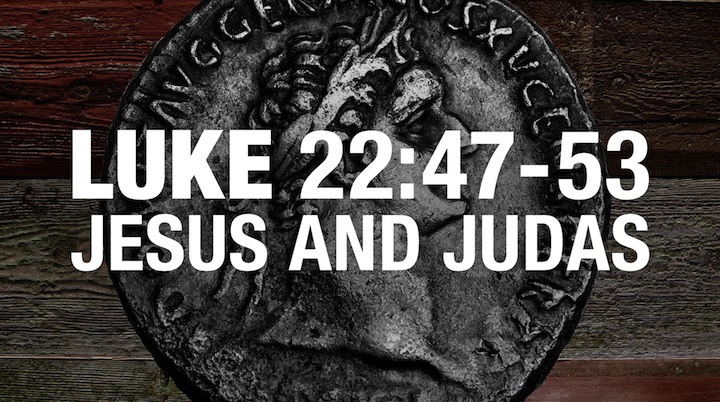
Can’t see the video? Download and install Flash to be able to view. Get Flash Here
On Mars Hill’s fifteenth birthday, we examine a sobering text of Scripture and lessons from the life of Judas. Judas was no victim. Judas’ desire was to betray Jesus, and Satan came and empowered that desire. The Bible doesn’t tell us why Judas did what he did; it leaves the question hanging in the air, “Could I do the same?” Each of us must humbly, soberly pray for God’s grace to not be a Judas.
47 While he was still speaking, there came a crowd, and the man called Judas, one of the twelve, was leading them. He drew near to Jesus to kiss him, 48 but Jesus said to him, “Judas, would you betray the Son of Man with a kiss?” 49 And when those who were around him saw what would follow, they said, “Lord, shall we strike with the sword?” 50 And one of them struck the servant of the high priest and cut off his right ear. 51 But Jesus said, “No more of this!” And he touched his ear and healed him. 52 Then Jesus said to the chief priests and officers of the temple and elders, who had come out against him, “Have you come out as against a robber, with swords and clubs? 53 When I was with you day after day in the temple, you did not lay hands on me. But this is your hour, and the power of darkness.”
The Holy Bible, English Standard Version copyright © 2001 by Crossway Bibles, a publishing ministry of Good News Publishers. Used by permission. All rights reserved. Quotation information.
Luke 22:47–53
47 While he was still speaking, there came a crowd, and the man called Judas, one of the twelve, was leading them. He drew near to Jesus to kiss him, 48 but Jesus said to him, “Judas, would you betray the Son of Man with a kiss?” 49 And when those who were around him saw what would follow, they said, “Lord, shall we strike with the sword?” 50 And one of them struck the servant of the high priest and cut off his right ear. 51 But Jesus said, “No more of this!” And he touched his ear and healed him. 52 Then Jesus said to the chief priests and officers of the temple and elders, who had come out against him, “Have you come out as against a robber, with swords and clubs? 53 When I was with you day after day in the temple, you did not lay hands on me. But this is your hour, and the power of darkness.”
Pastor Jamie:
How are we doing, Mars Hill? Good, good, good. I am Pastor Jamie. This is Pastor Dave Bruskas, Pastor Scott Thomas, and today is a big day. It’s a wonderful day. Today, we celebrate the fifteenth anniversary of Mars Hill Church. [Congregation applauding] We’re so thankful to Jesus for all the work that he’s done up to this point, and we’re looking forward to the next fifteen years and all that God’s going to do through Mars Hill.
We have some very special guests today, so if we could have Pastor Mark and Grace and what they lovingly call the Fab Five come join us onstage here. [Congregation applauding] This is Pastor Mark and Grace and his awesome family: Ashley, Zac, Calvin, Alexie, and Gideon. So, welcome.
A lot goes into the building of a church. A ton goes into the building of a church, and we have seen God move over these last fifteen years. Nothing, though, is more important than the preaching of God’s Word. That’s what we do. If we could do one thing at Mars Hill, we would stand up, and we would preach the Word, and Pastor Mark has poured his life into that. He has been faithful for the last fifteen years, preaching week in and week out. I want to read you one quick verse. First Timothy 5:17 says, “Let the elders who rule well be considered worthy of double honor, especially those who labor in preaching and teaching.” And this is Pastor Mark’s life calling. It’s his passion. It’s what he loves. And we want to honor him today for his faithfulness in preaching the Word for fifteen years, and we just want to say thank you. [Congregation applauding]
Thank you, buddy.
Being part of Mars Hill, you come to a service every Sunday, hopefully. Some of you have been around a long time. Some of you are new. I want to give you a little bit of scope. Over the last number of years, since we’ve been putting Mark’s sermons online, thirty million sermons have been downloaded. Thirty million sermons. So, God has used you to speak and preach to thirty million people that have listened. That’s a lot of preaching, and that’s a lot of teaching, and we’re just overwhelmed and thankful for that.
As a church, we get to enjoy that every week. We get to grow in Jesus. We get to be challenged. We get to be yelled at sometimes. We get lots of jokes. It’s fun. But God has just shaped us. And I want to say thank you personally. Without your preaching, I probably don’t know Jesus. I moved out from Montana. I came to Mars Hill. You were preaching through the book of Romans, and that’s where I met Jesus. I saw his grace and my sin for the first time. And so on behalf of the world, the thirty million people, on behalf of our church, and on behalf of my family, I just want to say thank you personally. [Congregation applauding] Hand it over to you, Pastor Dave.
Pastor Dave:
We wanted to acknowledge today Pastor Mark and his family’s service to Mars Hill, both the Executive Elders and Board of Directors. Pastor Mark, Paul says to the Corinthians that they are his letter of recommendation, that their transformed lives are evidence that God’s grace is working in him and through him. And so we wanted to take a picture of all of us together, and we couldn’t quite pull that off, but the closest thing we could do is this, so I’m going to ask Pastor Scott to hold this up for you to see from Qwest.
That’s awesome.
We wanted to give you a photo there. [Congregation applauding] We love you so much and Jesus has profoundly used you and the preaching of the Word to change our lives.
We also wanted to just thank Grace and the kids today for your sacrifice and service to Mars Hill Church. We love you. [Congregation applauding] Also, fifteen years of a lot of sacrifice and service, a lot of it behind the scenes that you may not know about, but it’s transformed lives. We love you. We appreciate you. You may have heard that we are planting a church in southern California, and it’s going to require that Pastor Mark travel there some, and we want you to go with him. And not only do we want you to go with him, we want you to go to Disneyland while you’re there. So, we got the family an annual pass to Disneyland, so that you guys can enjoy that together. [Congregation applauding]
What do you think, Lexie? Cool. Do you know that means? Do you guys know what annual pass means? You can go to Disneyland anytime you want. [Congregation laughing]
Like right now. Why not, huh? Great. We love you so much, and I’m going to ask Pastor Scott just to thank the Lord for your ministry and to pray a blessing upon the future. Thank you.
Pastor Scott:
Father, we are so blessed by this family, every one of them, every single one of them, by Pastor Mark, by Grace, and their dedication and their vision to plant this church, and then these children, all the Fab Five. They are, in fact, very fabulous, and we just want to give you praise for them and their family, for each one of them and their lives, their sacrifice that they poured into. But their sacrifice still is bowed before the one who gave the greatest sacrifice of all, Jesus Christ, the one who loved us greater than we loved ourselves. “And greater love has no man than this, that a man lay down his life for his friends.” And we give you praise for Jesus Christ and him being the one on the cross, that they follow. So, we ask for a special blessing on this family. We give you praise for them. We pray that you will honor them, sustain them, strengthen them, keep them safe, and keep the joy of Jesus Christ in their hearts and their lives for the glory of God. We just pray you a special blessing now on this great family. In Jesus’ name, amen. [Congregation applauding]
Pastor Mark:
Thanks, guys. Thank you, bro. Thanks, Pastor Dave. All right, love you, too. Thanks, bro. It is a great time at Mars Hill Church. For those of you who are new, you may have heard this story. We started as a little Bible study fifteen years ago, and God has been really, really gracious to us, and things are moving very quickly. It’s actually the most aggressive, fast-paced, forward-moving season we’ve had in the history of the church.
We have outgrown our Bellevue church building, so they’re in the process of moving. We’ve outgrown our Albuquerque church building, so they’re in the process of moving. We had outgrown our Shoreline church building, so they were recently moved into a larger space and also then planted Everett. As well, we are now preparing to launch with the Real Marriage campaign in early January, on one Sunday, churches in three states, so Rainier Valley in Washington; Portland, Oregon; and Orange County, California.
God keeps bringing us people, keeps bringing us favor, keeps bringing us opportunity. And to be honest with you, it’s very humbling, it’s very sobering, it’s very exciting, it’s very encouraging, and sometimes it’s very exhausting. So, be in prayer for us and our future, and that leads me to a really strange birthday text, if I might say that, but at Mars Hill, we’ve always done strange things.
We have a text today, as we’re in the Gospel of Luke, in the providence of God— We’ve been in Luke for a long time. It feels like much of our fifteen-year history, we’ve been in the Gospel of Luke. Today, we hit Luke #94, in Luke 22:47–53, and it’s about Jesus and Judas, and it’s a sobering text of Scripture, and it’s an examination of a life of a man who’s not famous, but he’s infamous. It is for us, I think, a timely word, because it shows we need to avail ourselves of Jesus’ grace. As he gives, you need to receive and walk with him. Jesus has given so much to you, and me, and to us, that we want to use this as an opportunity to examine ourselves and say, “Thank you, Jesus, for all that you’ve given. Let me be a good steward of that for the rest of my life.”
So we’re going to talk today about Judas. And as we examine the Scriptures, there are actually eight different men in the New Testament named Judas, and the other seven are pretty bummed that they’re named Judas. I mean, it’s like, “So what’s your name?” “Judas.” “Oh, I heard about—” “No, I’m the other Judas.” All right, like, there’s one Judas that is the most noteworthy of the eight, and that is Judas Iscariot. He’s mentioned twenty times in the four gospels. He’s also mentioned twice in the book of Acts.
The truth is we don’t know a whole lot about him. It seems like all the other disciples, out of the twelve, they come out of the region of Galilee where there are fishermen and farmers, and it’s a rural area where Jesus is from. But Judas, he’s seemingly, so far as we can tell, from another area. We don’t know a lot about him. We know that his dad’s name is Simon.
We do know that his whole life changed when, after a full night in prayer, the Lord Jesus Christ chose twelve disciples, twelve people to be personally mentored by him. In that day, oftentimes, you didn’t generally go to a school. You would pick a teacher, and you would sit under the teaching of that teacher, but you could only sit under the teaching of that teacher if they invited you. And so to get chosen by Jesus—you think about this. Of all the people on the earth, Jesus decided to pick twelve, and one was a man named Judas Iscariot. He became one of the twelve disciples of Jesus Christ.
As the list of names of the twelve is mentioned throughout the New Testament on multiple occasions, his name is always listed last because he’s the one who ended poorly, and so he is given a place of dishonor at the bottom of the list. Peter is always listed first, as he was their human leader.
Well, what’s interesting is he spent roughly three years with Jesus. And so as we have spent now a few years in the Gospel of Luke, for those of you that have been here or caught up online, imagine being there for everything we’ve been talking about, as an eyewitness. So, when people were raised from death, Judas was there. When Jesus was preaching and teaching, Judas was there. When demons were cast out, and people were healed, Judas was there. Judas ate his meals with Jesus for three years. Judas could approach Jesus at any time, because they were always traveling together, and ask him any question he wanted. Could you even fathom that?
In addition, if Judas wanted to be prayed for, he would just ask Jesus, and Jesus would stop and pray for him. It’s remarkable the access and the opportunity that he had in the grace of God. And Jesus loved him, and Jesus served him, and Jesus trained him, and Jesus taught him, and on one occasion, we read that Jesus even washed his feet, humbly, in the position of a slave, got down and served Judas. This man was given a remarkable opportunity.
We read in the gospels, as well, that his position on the team was financial. He was, essentially, the treasurer. He was the CFO. He was the CPA. He was the bookkeeper. He oversaw the resources of the ministry. Just like our church takes in resources, money, facilities, capital, so in that day they brought in resources. There were financial contributions. There was money generated. And the Bible says that Judas was the one who kept the money. He was the one who did all the accounting and stewarded the resources.
So, he was the business guy, and he was also a thief. The Bible tells us around John 12 that he had a pattern of stealing from the money that belonged to the ministry of Jesus. See, he was a taker, not a giver. He didn’t care about generosity for the sake of the gospel, the good news of Jesus going out. Instead, he only wanted gain for himself.
It’s an amazing opportunity for us to ask, “Am I a giver or a taker? Do I approach the ministry of Jesus, which would include churches like Mars Hill, as an opportunity for me to take and to take care of myself, or as an opportunity to give, that others might come to know Jesus?” Judas was a taker, not a giver, and he was secretly stealing money that ultimately belonged to the ministry of Jesus.
This would be like a church CPA, or a church CFO, or a lead pastor stealing money, putting expenses on the church credit card that are personal, trying to take advantage of their position, altering the books so as to skim off the top, or stealing. I mean, this would be today like church theft, people stealing things from the church, which tragically happens. Judas was that guy.
But what’s interesting is he appeared to be very generous, and he appeared to care about the poor, because in John 12, there’s an occasion where a woman comes in, and she’s sinful, and she’s repentant of her sin, and so in an effort to apologize to Jesus and to demonstrate the depth of her repentance, she anoints his feet with a very expensive perfume. And Judas stands back, and he says, “Oh, that’s worth a great deal of money. We should give that, instead, to the poor. We should take those resources and reallocate.” “Ooh, Judas, you are—you’re so civically minded.” The Bible says, actually, he wanted that perfume sold so that he could take the money and, rather than give it to the poor, put it in his pocket. He was a thief.
Nonetheless, Jesus loved him. Nonetheless, Jesus served him. And the Bible actually predicted, at least on two occasions in the Old Testament, events surrounding Judas’ life and demise. Psalm 41:9, written roughly a thousand years before Jesus was born, we read, “Even my close friend in whom I trusted, who ate my bread, has lifted his heel against me.” Jesus quotes this very verse in John 13:18, when he’s with his disciples. And he looks at them, and he says, “That prophecy in Psalm 41:9 is going to be fulfilled in one of you. You’re going to lift your heel against me.” In that culture, that was an act of dishonor. Today it’s like giving somebody the finger. And Jesus looks at his disciples and says, “One of you is going to do that to me.”
Also predicting Judas’ demise is a prophecy in Zechariah, uttered about seven hundred years before Jesus was born, because God knows the future. Zechariah 11:13, it says that Jesus ultimately would be betrayed for how many pieces of silver? Thirty, not twenty-nine, not thirty-one. All Scripture is God-breathed and perfect, and the prophecy was given seven hundred years in advance that Jesus would come, that the second member of the Trinity would enter into human history, and that he would be betrayed by a close friend, and the exact bounty on his head would be thirty pieces of silver, the equivalent of a couple of hundred bucks. And Judas did betray Jesus, and he did hand him off to the authorities to be murdered and put to death by crucifixion and execution, and he was paid thirty pieces of silver. That’s what the Scriptures record, historically.
Today we’re going to see Judas for the last time in the Gospel of Luke. We’ve been in Luke now for more than two years. This is the ninety-fourth sermon. We will finish at one hundred. We’re getting near the end, and all along the way Judas has been in the plotline of the life of Jesus. Sometimes he’s been up in the forefront, and he’s named and mentioned; other times he’s hanging in the background, just part of the crowd and following Jesus, but he’s been there the whole time, and this is the last occasion that we will see Judas in the entirety of the Gospel of Luke.
So here we find him, beginning in Luke 22:47. “While he was still speaking,” that is Jesus, “there came a crowd, and the man called Judas, one of the twelve, was leading them. He drew near to Jesus to kiss him, but Jesus said to him, ‘Judas, would you betray the Son of Man,’” God became a man, “‘with a kiss?’ And when those who were around him saw what would follow, they said, ‘Lord, shall we strike with the sword?’ And one of them struck the servant of the high priest and cut off his right ear.” The other gospels say this was, in fact, Peter the Impetuous. Peter is always ready, even when he doesn’t know what he’s doing. That’s Peter. “But Jesus said, ‘No more of this!’ And he touched his ear and healed him.” Now, you’ve got to see this. This man comes to arrest and murder Jesus. Peter cuts his ear off, and Jesus heals his murderer. That tells you a lot about Jesus. “Then Jesus said to the chief priests and officers of the temple and the elders,” all the religious leaders, “who had come out against him, ‘Have you come out as against a robber, with swords and clubs?’” He’s saying, “When have I ever carried a weapon?” “‘When I was with you day after day in the temple, you did not lay hands on me. But this is your hour, and the power of darkness.’”
Jesus is in the Garden of Gethsemane. It’s a place that the Bible told us previously he would go to for prayer. It was his place for silence and solitude and prayer, and Christians, in general, and pastors, in particular, oftentimes have a place for silence, and solitude, and prayer, and journaling, and Bible-reading, and to get alone with the Lord. Jesus here is meeting with the Father in the Garden of Gethsemane, as was his custom.
Judas knew where he would be, because Judas was part of the inner twelve. This is like a pastor is getting prayer time, and one of his associates decides to betray him, and knows exactly where he’ll be praying, and so he takes his enemies there. I mean, it’s treasonous, it’s treacherous, it’s tragic.
And it’s nighttime. Jesus says, “Oh, you came at night, when it’s dark. I’ve been out at the temple courts. I’ve been preaching and teaching in open public forums during the daylight. If you wanted to arrest me, why didn’t you do it then? Oh, I’m not guilty of anything.” But, see, this isn’t an arrest. This is a murder. They do it at night when everybody’s at home in bed, so that no one can see. And he says, “Now is the hour of darkness.” What he’s saying is, the darkness that surrounds us is not as dark as the darkness that’s in you. It’s all darkness.
Judas comes up and betrays him with a kiss. In that culture, this was a common form of greeting. So Judas, with the soldiers, is coming in the darkness of night to a dark garden, where Jesus would have been with his other eleven disciples, twelve men total. And the soldiers would have asked Judas, “How will we know which one is Jesus? It’s going to be dark and hard to tell.” Judas says, “Just wait. I’ll approach him like a friend, a pretend friend, and I’ll kiss him, and the one that I kiss, that’s the one who is Jesus, to be arrested and put to death.”
In that culture, again, they did greet with one another with a kiss. It was common. The Bible says, elsewhere, that Christians are to greet one another with a kiss. The principle is an affectionate greeting among the people of God, like a family. In our day, that would be a handshake or a firm hug, but in that day, it was a kiss.
In some cultures, it’s still this way, correct? I remember the first time I met a family like that, I think it was a Spanish family, early on in Mars Hill. I think one of their kids, it was, became a Christian. The family was really excited, showed up for a service. “Oh, thank you, Pastor.” And the grandma comes up, comes to kiss me. I’m trying to get certain, you know, maybe get her a cheek, trying to defend myself. And then Mom comes to give me a kiss, and then Dad and Grandpa are in line, and I’m freaking out, like, I’m not making out with the whole family. I’m Irish. We have intimacy issues. I don’t like people touching me, you know, like, but the whole family had to give you a kiss, you know, and the whole time you’re like, “Okay, I’m going to be a moving target and keep my lips out of the way.” And some families are still like that, and some cultures are still like that, and some Eastern cultures are still like that, and that’s how it was in that day, and that’s how Judas comes to betray Jesus.
Can you imagine what that felt like for Jesus? “Here comes my friend. I have fed him, housed him, loved him, cared for him, taught him, invested in him, endured with him for three years.” Have you had that moment where somebody you trusted in and loved, they just betrayed you? “You did what?”
Can you imagine how the disciples felt in that moment? You’re a team. You’re together. Right? Have you been on a competitive sports team, or have you been in a military fighting unit, or have you been part of a small class in a school that was together for very many years? Have you been part of a work team or a ministry team, that you had intense life experiences, lots of time together over the course of multiple years, and then one of you absolutely does the unthinkable?
I’m sure the disciples were just stunned. “Judas? You’re the one who’s going to murder Jesus? You’re one of us. We thought we were all friends. We thought we all belonged to God. You’re an enemy of God and us.” And, again, this is the last time we see Judas Iscariot in the Gospel of Luke.
Jesus is arrested. Jesus is run through a series of false trials, because this is a murder. All of this happens at night. You’re going to see it in the coming days and weeks as we study together, Jesus is ultimately beaten beyond recognition. He is crucified and put to death. He is buried, and three days later he rises.
How does Judas feel about what he has done to betray Jesus? Well, what is tragic is he has remorse, but not repentance. He feels bad, but he doesn’t change. See, there’s another man around this same section of Luke, who also betrayed Jesus. What was his name? Peter. He denied Jesus Christ three times. And then it says that he wept bitterly, that he was devastated, that he felt horrific about what he had done!
As soon as he heard Jesus was alive, after the resurrection, Peter ran, the Bible says, to the empty tomb, looking for Jesus. He was the first one to walk into the empty tomb. He wanted to see Jesus. He wanted to look Jesus in the eye. He wanted to tell Jesus that he was sorry, and he wanted to ask for forgiveness. That’s repentance. And Peter did change. He was not a perfect man, but he was a changed man.
Judas had remorse, but not repentance. He felt bad, but he never changed. So, the Bible says that he had remorse, but rather than repenting—and repenting is where you tell people you’re sorry, and you own what you’ve done, and you tell God you’re sorry, and you own what you’ve done—he just had remorse.
All right, this is some of you. You cry, and you feel bad, and you grieve the consequences, but you don’t hate your sin, and you don’t bring it to God and the people you’ve offended, and that leads to discouragement, and depression, and despair. It can ultimately culminate in suicide and, tragically, that’s exactly what happened with Judas Iscariot.
Matthew records and Acts 1 picks up the fact that then Judas, rather than going to Jesus, he went to a tree. And rather than saying he was sorry, he made a noose. And rather than making it right, he made it end. And he put a noose around his neck, and he jumped off a tree branch, and he hung himself. Acts records that, in some way, his body then fell off, and his intestines burst out, and his guts came out of his body, and that’s the end of Judas Iscariot. That’s remorse, not repentance. It’s not enough to just feel bad. You’ve got to bring it to God, and you need to change by the grace of God. Judas never got there. Peter did; Judas didn’t.
And then the question is asked, and I’m sure some of you are thinking, “Why did this happen? Why did this happen?” And the Bible tells us in John 6, that Jesus looked at his disciples, this is at the end of John 6, and he says, “One of you is a devil.” Jesus knew early on what was in the heart of Judas.
Also, in Luke 22:3–6, just prior to this, the disciples are together having a meal, and it says that Judas opened his heart to Satan. So, he’s an unbeliever who opens himself up to Satan. See, we’re to be filled with the Holy Spirit. And if we’re not filled with the Holy Spirit, we could leave ourselves open, if non-Christians, to be open to unholy spirits.
See, we live in a world where we sort of discount, or dismiss, or disregard Satan and demons, that which is evil, but the Bible doesn’t. The Bible is exceedingly clear. There is a Satan, there are demons. There is not just evil in the world; there is personal evil behind the evil in the world. It doesn’t matter how many wars we fight, how many dollars we spend, how many elections we hold, how many prisons we make, how many locks we put on our home, how many bullets we put in the chamber, sin and death continue. Why? Because Satan and demons empower the fallen, wicked, deadly desires of unrepentant sinners, and that’s exactly what happened to Judas.
Judas was no victim. Judas’ desire was to betray Jesus, and Satan came and empowered that desire. This is like a man who is in a boat and wants to proceed toward a destination, and he’s in the boat, and he has the map, and he has the compass, and he is determined to row hard and strong toward his destination. And it’s as if Satan then sends a stiff breeze into the sail to help him get there more quickly, but it doesn’t mean that that man is a victim being taken in a direction that he does not want to go. Rather, his desires are being empowered by the enemy of God.
This is exactly what Acts 1:25 says. It says, quote, “Judas turned aside to go to his own place,” that Judas knew exactly what he wanted to do, and Satan wanted to help him do it. And let me say this. Satan doesn’t make us do things we don’t want to do, but he empowers us to do things that God doesn’t want us to do. If those are the things that we want to do, we are opening ourselves up to our enemy.
I’m not saying you’re going to lose your salvation if you’re a Christian. I’m not saying that you’re going to be demon-possessed. I’m not saying that at all, but I’m saying that our sin nature has foolish, wicked, deadly desires. The world in which we live provides evil opportunities, and Satan and demons will like to empower those evil desires to do deadly things in the world that God made.
If you’re a non-Christian, you are exceedingly susceptible, not just to being influenced, but completely overtaken, because you have no authority over Satan and demons, apart from Jesus Christ. This is why, friends, some people do horrific things, not just in the days of Jesus, but in our day, as well. And people ask, “How could they do that? What happened?” Well, they had an evil desire in them, an opportunity in the world, and an enemy who empowered that evil desire toward destruction and death. And that’s the story of Judas. He’s no victim. He’s no victim, but Satan is involved.
And then the Bible gives him three names. See, his title was “Disciple of Jesus Christ,” “Apostle of Jesus Christ.” What a title. He went from disciple and apostle, to traitor, betrayer, and son of destruction. Those are the three titles that the Bible gives him. Traitor! He was loved by Jesus. He was friends with Jesus. Or I should say, at least Jesus was friends with him. And he was a traitor! He sold Jesus for a couple of hundred bucks to his enemies.
And he was a betrayer. Those disciples had walked away from their businesses. They had given their life to follow Jesus, and he was a betrayer. He betrayed Jesus and he betrayed the other disciples.
And lastly, John 17:12, Jesus says that he is the son of destruction. Some of your translations will say, “The one doomed to destruction.” In the providential understanding of God, this is fully known by God, who Judas would be and what he would do. And Satan empowered those evil desires, and God knew that it would all happen.
I want to be clear on this. God didn’t make it happen, because God is good, not evil. But God uses even evil for good. And he uses the most horrific evil, the betrayal and murder of the second member of the Trinity, the Son of God, the Lord Jesus Christ. He uses the greatest evil for the greatest good, the glory of God and the salvation of sinners, and that’s how God uses even the evil of Judas for his glory and our good, because God works out all things for the good of those who love him and are called according to his purpose, because what is meant for evil is used for good and the saving of many lives.
“Why?” Isn’t that the question you have? So many do. “Why?” And here’s the truth. The Bible does not tell us. Some say, “Well, maybe he was a zealot, and that was a political party, and they wanted Jesus to be a political ruler to overthrow the government. He kept talking about the kingdom, and when they realized he didn’t actually want to be a political king, as part of their political party, Judas got disappointed and murdered him.” I don’t know. It doesn’t say.
Others say, “Well, Jesus became very powerful, and Judas became very jealous.” Others say Jesus had disciples that were closest to him, and Judas was not one of them, and so he became bitter at the position he had on the team. Others say he was in it for the money. He was a con man, and as soon as he could tell that Jesus’ life was about over, and the money was about to run out, and there was nobody else to rip off, he just cashed in his final investment and betrayed Jesus for the last few bucks, ‘cause he was a lover of money.
I don’t know. I appreciate the fact that the Bible doesn’t exactly tell us why Judas did what he did. The Bible tells us who did it, where he did it, when he did it, how he did it. Doesn’t tell us why he did it, and so it leaves the question hanging in the air for us to ask, “Could I do the same?” I may not understand what was in the heart of Judas, but I know what is in my heart, and you know what is in your heart, and we need to ask, “How am I capable of betraying Jesus and his people, as Judas was?”
We cannot look at the story and say, “He’s a bad guy, I’m a good guy; I’m so glad I’m not like Judas,” because that’s how we get into serious trouble. We lack humility and sober-mindedness, and instead we have pride and arrogance. In the grace of God, we should avoid that as much as possible. I believe sometimes the most deadly examples are some of the most powerful examples, and sometimes those are negative examples, and Judas serves as a negative example. It’s God’s way of saying, “You are in danger; stay close to my Son.”
How’s it going for you and Jesus? It’s a sober sermon. It’s a sober Scripture. One of the most infamous, arguably the most infamous man in the history of the world. So, I want to close with eight reflections, lessons from Judas.
Number one: Sometimes you bear no responsibility for a person you love who betrays you and/or wrecks their life and shipwrecks their faith. How many of you know someone, they have wrecked their life and shipwrecked their faith? And some of you feel a sense of guilt or responsibility.
Now, perhaps you should. “I didn’t love them well. I didn’t pursue them. I didn’t help them. In fact, I contributed to the circumstances that led to their devastating conclusion.” And if so, own it to God. Own it with them. Apologize. Try and make right and make amends in the grace of God.
But sometimes it’s not your fault. There’s nothing else you could’ve done. They were determined to self-destruct. In this occasion, Judas wrecks his life and shipwrecks his faith, and none of us can stand back and try and pin any modicum of responsibility on Jesus. You can’t say, “Well, if Jesus was a better friend.” He’s God, the perfect friend. “Well, if Judas just had better community.” Look at his community group! It’s God and eleven disciples! Right? “You have a problem? Well, you could talk to Peter or John. Hey, pick your favorite New Testament author and chat with him in your Community Group.” He’s not lacking in opportunity for counsel and care! You can’t look at his situation.
But, see, here’s the truth. We live in a culture where it is profitable to be a victim. If you can prove you’re a victim, then you can take your life and you can push the responsibility for whatever failures, and flaws, and faults you have on someone else, and it’s their fault, and you’re abdicated of responsibility, and you may even get some money for it. So, we blame our parents. We blame our genetics. We blame the culture. We blame the enemy. I mean, it’s the blame game.
I mean, even today, you know, you never see protests where people stand up with a sign saying, “It’s my fault. I’m sorry.” It’s always somebody else’s fault. You’re responsible for your own life. There may be people and circumstances that have contributed to making your life more difficult, and I don’t want to dismiss those or diminish those, but Judas has nobody to blame but Judas, and perhaps you have nobody to blame but you. And if you’ve done it to yourself, you’re not a victim. You’re a fool. And I tell you that in love. But Judas is not a victim. He’s a fool.
Number two: Sitting under good Bible teaching is not enough; you have to believe it. See, sometimes what happens is a person who seems to be a Christian, or maybe they even seem to be a ministry leader, they wreck their life and shipwreck their faith, and everybody wants to blame the senior leader. “Oh, well, obviously, that church doesn’t do a good job.” And I hear this about other churches, and I’m sure they say it about ours. “Oh, so-and-so did this, or so-and-so did that. Well, that’s because they go to that church. You know that church.” “No, actually, I know that pastor, and they love Jesus, and they’re really nice, and they do teach the Bible. And we don’t agree with them on everything, but it’s not the teaching. It’s the believing on the part of the hearer, not the proclamation on the part of the instructor.”
Sometimes people like to blame the teacher. Oh, yeah. And the truth is people are products of their instruction, but in this instance, we can’t look at it and say, “Poor Judas. You know, he just didn’t have a lot of theological formation and education. He didn’t get a lot of Bible teaching. He sat under, you know, not the best instruction.” Right? Three years, he went to the seminary of Jesus Christ. There are only twelve in the class! [Congregation laughing] Right? He’s walking around with the breathing, breakfast-eating Word of God, right?
I mean, there are days when Jesus is like, “All right, turn to Daniel, and we’ll talk about the day I showed up in a furnace.” I mean, that’s a really amazing Bible study! Right? “Tell you boys about Daniel, because I was there.” Judas has complete access to all the biblical teaching that he needs to live a life of godliness.
And you know what? So do we. I mean, right now, you could log on to the Internet and download amazing world-class Bible teachers for free, more than you could possibly ever listen to. You can go online. You can find Bible study tools and resources for free, the kinds of opportunities that the world has never had. You could buy books and commentaries and concordances and software. You can go to conferences and seminars. Even if you can’t afford the Internet, you can turn on the radio, and it’s there for free. You can come to church. It costs nothing. We go through books of the Bible. You could take classes. You can go to Community Group. You can be in a Redemption Group. You can understand counseling in community. If you want, we’ve got a master’s level program called “Re:Train.” It’s all there! It’s like somebody starving to death at the grocery store. That’s a decision you made.
Sitting under good Bible teaching isn’t enough. And my hope, my prayer is to increasingly be a better Bible teacher. Okay? I really love teaching the Bible. I’ve been doing this for fifteen years. I love Mars Hill Church. I want to die a long time from now as a pastor at Mars Hill Church. Okay? I love teaching the Bible here. This is a great church. I have so much freedom to teach the Bible. They don’t put time restrictions on me. I don’t know if you’ve noticed that. [Congregation laughing] I mean, like, it’s amazing. I want to thank you for hanging in there.
I did a conference recently in Atlanta called, “Catalyst,” and it was great. I loved it, and they were awesome. And before I got up, they were, like, “You’ve got thirty-five minutes.” It’s like, “All right, great, thank you. I appreciate one minute, but at Mars Hill we call that an introduction, thirty-five minutes.” Right? Like, it was great, but I know pastors, and they’ll tell me, “How do you get people to stay there?” I say, “What do you mean?” They say, “Well, if I talk over twenty-five or thirty minutes, people literally get up and start leaving.” I say, “People start getting up and leaving, but it’s not because of the time, it’s because of the content, when I’m preaching. They don’t like what they heard. But most people hang in there, and they’ll hang in there for an hour plus.”
I want to thank you for that. I want to thank you for being a church that says, “We love the Bible. Help us learn the Bible. Teach the Bible.” I mean, we’re at Luke #94. We’ve grown by a few thousand people in Luke. All right, no gimmicks, no tricks, Bible teaching, and the people of God in Community Groups.
But sitting under Bible teaching can give the impression that you are a Christian and are growing spiritually. Jesus’ brother, James, says it this way in the book bearing his name. “Do not merely listen to the Word and,” what? “Deceive yourselves. Do what it says.” See, you need to hear the Word of God and obey the Word of God; otherwise, you’re prone to deception. “I’m very knowledgeable. I’m very spiritually mature.” Are you obeying? Are you believing what you’re told?
So, you know, I tell you all the time, “This is the Word of God. Jesus is the Son of God. He is God among us. He lived without sin. He died on a cross, in our place, for our sins. He was buried. Three days later he rose from death. He is ascended on high. He is coming again to judge the living and the dead. He is Lord. He is King. He is God. He is Christ. He is friend. He is Savior. He is all!” But you have to believe that. Do you believe that? I really want you to believe that.
See, Judas heard that, but he didn’t believe that. Jesus gave him all the information, and Judas didn’t respond with faith. He didn’t trust a word of it. Sitting under the best Bible teaching has the potential of merely increasing your self-deception. It also increases the opportunity of experiencing sanctification, growing in grace. And whether it becomes self-deception or sanctification is contingent upon you believing and obeying what the Bible actually teaches.
I’m not saying that I’m always right, and that I never get it wrong. And I want to do my best. So, even take what I say, like the Bereans did, take it to the Bible. Check it and make sure it’s what the Bible teaches. And if I’m wrong, help me to repent and do a better job, because at the end of the day, we want the truth to be told, we want Jesus to be loved, and we want people to be served.
Number three: Being in community with Jesus’ people is not enough; you have to be one of them. We’re glad you’re here. We hope you get in a Community Group. We hope you get connected to God’s people. You need to be connected to God’s people, but first you’ve got to be connected to God, or at least, at some point, you need to be connected to God.
Again, look at Judas’ Community Group! I mean, what an amazing—that’s a Community Group, right? This is the first Community Group in the early church. Here’s Judas with John: 1, 2, 3 John; the Gospel of John; Revelation; pretty impressive resume; he wrote books of the Bible. He’s in that Community Group. Peter: leader of the disciples; 1 and 2 Peter; he wrote books of the Bible. That’s who’s in his Community Group! That’s amazing, but that’s not enough.
You can be in community. You can have Christian family, amazing! You could go to Christian school, maybe amazing, maybe not. You could be in a dynamic youth ministry. You could go on an amazing retreat, or a missions trip, or a conference. You could go to a great church like Mars Hill. You could be part of what God is doing. You could know the people of God. You could see the presence of God. You could experience the work of God, and not be a child of God, because you don’t believe in Jesus.
And sometimes people think, “Well, I’m fine because my family loves the Lord,” or “I’m fine because my church loves the Lord,” or “I’m fine because my school loves the Lord,” or “I’m fine because my friends love the Lord.” Do you love the Lord? Do you love Jesus? Judas didn’t. You say, “I know Jesus.” Do you love him? See, Judas knew Jesus, didn’t love him. You can know Jesus and not love him. Knowledge is information, but love is what leads to the transformation.
Number four: Leading a ministry is not enough; you have to love Jesus. Judas is in full-time ministry for three years. He’s part of the staff. He’s with Jesus! It’s like Jesus is the senior pastor, and here are all his associate pastors, and this is his top twelve, and there are others beyond that. You can be in ministry and go to hell. You can be in ministry and be an enemy of God.
For me, this is like a kick to the soul. When I was a brand-new Christian, I had this strange experience at a conference. It was a mainline denomination, and they brought me in to their national convention to teach a seminar on how to reach young people. This was when I was in my twenties. I had no right to be there. I had no idea what I was doing, but I got up to teach, and they wanted me to talk about how to reach young people, and so I started with Romans 1, that, “The gospel, this good news about Jesus, it’s the power of God to the salvation of all who believe!” And I said, “You know, young people don’t really get excited about religion and tradition and rules, but they’ll get pretty fired up about Jesus. So, people need to preach Jesus, and believe in Jesus.”
And I had a pastor raise his hand. And he was an honest guy. It was a room of maybe a couple of hundred people, and he said, “What if you don’t believe that?” I was like, “Believe what?” He said, “Well, that Jesus died and rose.” “What?” [Congregation laughing] I was a brand-new Christian. I was a brand-new pastor. I didn’t know there was a possibility of a pastor who didn’t believe in the resurrection. I said—and I’m not the best at filtering my own thoughts, you know, and I said, “Well, you’re not a Christian, man. You’re probably going to hell and stuff, so—” [Congregation laughing]
I was like, “Ah, I can’t get that toothpaste back in the tube. Like, that’s—that’s out.” [Congregation laughing] And then I looked at the people. I was like, “Do some of you guys not believe Jesus is alive?” And some of them didn’t. “Oh, well, then I’m not going to tell you how to get young people, because I don’t want them to go where you’re going. Instead, let’s—” And I started doing evangelism with the pastors. [Congregation laughing] Because leading a ministry is not enough; you have to love Jesus.
And some of you say, “Well, I’ve had bad experiences at church and crazy stuff.” Do you know what? I don’t know, I don’t judge, Jesus does, but maybe some of the leaders weren’t Christians, and that was the problem. I had this early on with a leader in Mars Hill. He came from another church, and he’d led there, and he’d done well, and he showed up, and he had habitual sexual sin in his life, and I finally met with him.
I’m like, “Buddy, look, we love you, man. I don’t understand. What’s going on?” I said, “Are you a Christian?” He said, “Yeah, I’m a Christian.” He was kind of offended that I asked. I said, “Well, how do you know you’re a Christian?” He said, “Well, I’ve been serving the Lord for years, and I did this, and I did that, and I have been on the stage at this conference, and I worked at this church.”
I said, “No, you’re talking about you, not Jesus; what you’ve done, not what he’s done. That’s not how you know you’re a Christian.” And, in the grace of God, he was humble, and he said, “Oh.” And so we talked. He really didn’t know Jesus as God and Savior. And he did give his life to the Lord, and he has had a radical life change, and his whole life course has changed. He’s doing great, and I’m really proud of him, and he is serving the Lord, but you can be in ministry and be an enemy of God. Judas was.
Number five: An enemy of Jesus parading as a minister can lead people astray for thousands of years. Can you imagine how confusing it was for the people who were following the ministry of Jesus, but they had a particular affinity toward Judas? Because, see, that’s what happens, right? Like, we’ve got Mars Hill Church, and we’ve got all of our churches, and we’ve got various leaders, and then imagine we’re all going together, and then one person really gets off track, and the people who are with us, but they have a particular affinity for that leader, all of a sudden, they’re confused, like, “Where’s he going? What’s he doing? Who’s right, who’s wrong?” There’s a conflict, and tension, and drama, and, “Oh, no, which side are we on, and who’s responsible for him?” And they get defensive.
I mean, this is a very divisive moment for the ministry of Jesus. And I’m sure there were some people who were confused. Like, “Wait, we’ve been following Judas, and he’s been following Jesus, and now we’re following Judas. We don’t know if he’s following Jesus. Do we keep following Judas or not?”
And some people, even to this day, have. It’s been a few thousand years, and you can look it up on Amazon. Just put in “Judas,” and there are all of these books about Judas. “Oh, he’s misunderstood. Let’s psychoanalyze him. Maybe he was onto something, and Jesus was the bad guy, and Judas was the good guy.” Wow. We even have something that was kind of a lost gospel. It’s called the Gospel of Judas, and it’s not in the Bible. It was written long after Judas was dead, something called pseudepigrapha, which means “pen name.” And now “scholars,” educated beyond their intelligence, you know, are sort of looking at it, saying, “Well, maybe there’s something here.” And the story there is that Jesus and Judas had a deal, and Jesus told Judas to murder him, and Judas obeyed Jesus and murdered him, and then Jesus was going to promote Judas to heaven in a primary position of leadership. [Congregation laughing] That’s an interesting hypothesis . . . for some people. It’s crazy. Some people are still following Judas, trying to make him into the good guy.
Number six: Sometimes false teachers appear to be credible, loving, and generous to the poor. Did Judas appear to be credible? “So, where did you go to seminary?” “Jesus Christ Seminary.” “Really? Who was your professor?” “For Old Testament, I had Jesus Christ. For Prophecy, I had Jesus Christ. For Preaching, I had Jesus Christ. For Leadership, I had Jesus Christ. For Evangelism, I had Jesus Christ.” “Well, have you ever worked in ministry?” “Yeah, I did an internship for three years.” “Oh, really? With who?” “Jesus Christ.” “Really?” “Yeah, it was pretty fantastic. I saw him raise people from the dead. One day, a few guys went water skiing, no boat, no skis.” [Congregation laughing] “You should read the resume. It’s pretty interesting, that resume I’ve got.”
He looked credible, and sometimes false teachers, false leaders, they come out of good seminaries, good Bible colleges, good churches, good denominations, good traditions, and they go a bad trajectory. Also, he appeared loving. If you had asked, “Well, Judas, is he a mean guy? Is he a bad—?” “No, he’s a loving guy. The last time I saw him, he walked up, and he gave Jesus a big kiss, and they’re best friends. To me, it looks like he’s a very loving guy. It looks like he loves Jesus, and he’s generous. Oh, he’s so generous, this one day, people were wasting money, and he said, ‘No, let’s give it all to the poor!’” False teachers appear to be credible, loving, and generous to the poor, and sometimes it’s just another Judas.
Number seven: You cannot lose your salvation, but you can fake it. Judas never lost his salvation. He’s the one doomed for destruction. Jesus tells them all the way back early in the ministry in John 6, “One of you is a devil.” Judas was stealing money from Jesus the whole time! And see, what sometimes happens is we think, “Oh, that person was walking with the Lord, and then they just disappeared, or they fell away.” No, you know what? In their heart, they had been drifting for a long time, and then you just see externally who they are internally. Judas’ betrayal of Jesus was not a change in his character; it was a revelation of his character. He hadn’t changed; he had simply been exposed.
You cannot lose your salvation, but you can fake it, and Judas faked it. Some of you are faking it. You’ve learned the Christian language, you’ve been around the church, you know a few believers, your parents love the Lord. You can fake it. You can fake it, and the way you know you’re faking it is you present yourself as one person in public, and you’re not that person in private. In public, Judas was associate pastor to Jesus Christ; privately, he was stealing money.
Who are you privately? Who are you really? Who are you truly? Are you a Christian who loves Jesus and hates your sin, or are you just a Judas who’s faking it? Are you faking it so that your parents will be happy, your friends will be happy, your school will be happy, because it benefits you in some way?
And number eight: How your life concludes is far more important than how your life begins. Amen? It’s not the first day of your wedding and marriage that’s the most important; it’s the last day of your marriage. It’s not the first day you get saved and baptized; it’s the last day of your life. See, we tend to make a big deal of the start, and we should, and we should celebrate and rejoice. People are getting married. People are making professions of faith. People are being baptized. Praise be to God. But the most important day: the last day.
Some of you come in here, and you say, “You know what? It’s not been great ‘til now.” Praise God you’re still alive. He loves you. This is a word of encouragement and exhortation and invitation to say, “You know what? Judas ran away from Jesus, and it killed him. I’m going to run to Jesus, so I can live with him.” And that’s God’s invitation to you today. Some of you would say, “Man, it started good, but it’s not gone well.” Then do like Peter did: get brokenhearted, run to Jesus and his people, receive the grace of God, and finish well.
I believe this is a prophetic word at a significant time in the history of Mars Hill Church. It’s like the early years with Jesus and Judas for us right now. I mean, God is with us. God is with us, Mars Hill. We are a miracle. We’re one of the largest, fastest-growing churches. We’re planting in other states. People are getting saved. Marriages are coming together. Babies are getting born. People are being transformed. We can’t even keep up with all the grace that God has given us. And it’s wonderful and it’s amazing and it’s sobering, because it’s about the last day.
Had you looked at Judas early on, you would’ve said, “That guy, what a life, what an amazing life.” We’re there. A guy like Peter, through humility and repentance, his last day’s a great day. “Crucify me upside down! I still love Jesus! I’ll tell him you said hi.” That’s Peter. Judas hangs himself, and his guts come spilling out, and the last day is a tragic day. And I want you, and I want me, and I want us to be able to say like Paul, “I’ve run my race! I’ve kept my faith! And now I’m ready for my reward.”
Please pray that for me. Please pray that for your elders, and your deacons, and your Community Group leaders, and your Redemption Group leaders. Please pray that for yourself. Please pray that for your family. And it all starts with each of us making a decision in the grace of God, humbly, prayerfully, soberly saying, “God, give me the grace to not be a Judas. Save me from myself.”
And so, Father, we ask that right now. Lord Jesus, we see how you received Peter, and we see what happened to Judas when he ran from you, rather than to you. Holy Spirit, I pray that, right now, those who have been faking it, that they would come to a real saving knowledge of Jesus. And God, on this, our birthday, I thank you for the opportunity to preach what is an awkward birthday sermon, but fifteen years in, it feels like the early days of Jesus and Judas, where it’s exciting, and there’s a lot of grace, and it’s amazing, and we’re so richly blessed. And God, for myself and for our leaders, and for our people, we want to humbly, soberly, aggressively, confidently, continually repent of sin, and stay close to Jesus, and finish well, by the grace of God. So, Lord Jesus, please allow our run to continue for fifteen more years, and fifteen more years after that, and fifteen more years after that. And, Lord God, I thank you that I get to teach the Bible to the people of Mars Hill Church. I thank you that I’ve gotten to do that for fifteen years. I thank you that you love these people, and I pray that none of them would end like Judas, in Jesus’ name. Amen.
Note: This sermon transcript has been edited for readability.

Just Sitting Under Good Bible Teaching Isn’t Enough
October 16, 2011

Judas Is an Example for Us
October 16, 2011

Remorse vs. Repentance
October 16, 2011







